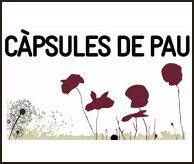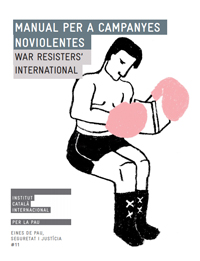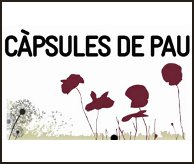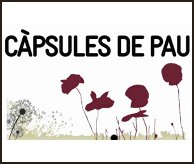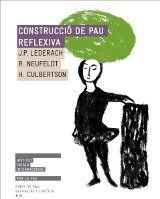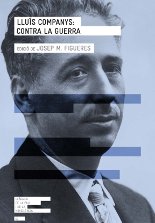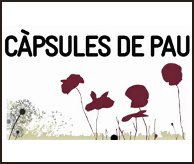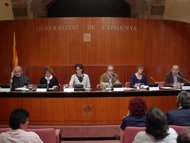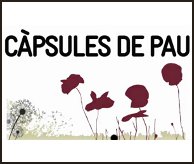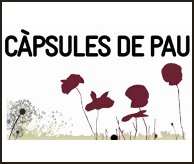A new video of the project ‘Peace Capsules’, coproduced by ICIP and Col•lectiu Contrast, has been published this week on the ICIP website. It is a short one minute long video entitled ‘What is Peace to Martín Ernesto Mozé?’ and in which Mozé, member of the organization H.I.J.O.S., considers what peace means to him. The video is accessible both on the ICIP website and on the ICIP Youtube Channel .
Until the 21st September 2014, International Day of Peace, ICIP will publish a new video capsule each week. Each capsule will count with the participation of an activist, actor or academic who will think of what peace means to him/her. The aim of the project is to compile different approximations to the concept ‘peace’ on the ICIP web site.
Author: whads
Manual per a campanyes noviolentes. War Resisters’ International
What is Peace to Nizar Saghieh?
A new video of the project ‘Peace Capsules’, coproduced by ICIP and Col•lectiu Contrast, has been published this week on the ICIP website. It is a short one minute long video entitled ‘What is Peace to Nizar Saghieh? ‘ and in which Moulud, Saharaui artist, considers what peace means to him. The video is accessible both on the ICIP website and on the ICIP Youtube Channel .
Until the 21st September 2014, International Day of Peace, ICIP will publish a new video capsule each week. Each capsule will count with the participation of an activist, actor or academic who will think of what peace means to him/her. The aim of the project is to compile different approximations to the concept ‘peace’ on the ICIP web site.
What is Peace to Mohamed Moulud Yeslem?
A new video of the project ‘Peace Capsules’, coproduced by ICIP and Col•lectiu Contrast, has been published this week on the ICIP website. It is a short one minute long video entitled ‘What is Peace to Mohamed Moulud Yeslem? ’ and in which Moulud, Saharaui artist, considers what peace means to him. The video is accessible both on the ICIP website and on the ICIP Youtube Channel .
Until the 21st September 2014, International Day of Peace, ICIP will publish a new video capsule each week. Each capsule will count with the participation of an activist, actor or academic who will think of what peace means to him/her. The aim of the project is to compile different approximations to the concept ‘peace’ on the ICIP web site.
‘Construcció de pau reflexiva’, by J.P. Lederach, R. Neufeldt and H. Culbertson
The goal of the handbook Construcció de pau reflexiva (‘Reflective peacebuilding) is to improve peacebuilders’ ability to be reflective practitioners; this involves enhancing peacebuilders’ capacity to design and impact transformative change, and track and improve upon those changes over time, in unpredictable conflict contexts.
The tools available in the book are designed to help focus on dimensions specific to peacebuilding work and provide practitioners with resources for enhancing their creativity in developing learning, monitoring and evaluation systems that are suitable for a specific context.
The overall theme of the handbook is learning before, during and after implementation of peacebuilding programs. The book explores the connections between learning and effective peacebuilding practice; the ethical considerations for monitoring, evaluation and learning; the types of change that peacebuilding practice promotes; planning for long-term change and scaling up activities; and concludes with a chapter on documentation practices that can enhance learning.
John Paul Lederach
John Paul Lederach has worked for over thirty years in the field of conflict transformation and peacebuilding in Latin America, Asia, Africa, Central Asia and North America. As the result of this experience, he has published numerous books and handbooks on the subject. He is currently Professor of International Peacebuilding with the Kroc Institute for International Peace Studies at the University of Notre Dame, and concurrently Distinguished Scholar at the Center for Justice and Peacebuilding, at Eastern Mennonite University.
‘Lluís Companys: contra la guerra’
ICIP and Angle Editorial have just released a new issue of the book collection ‘Classics of Peace and Nonviolence’ entitled Lluís Companys: contra la guerra (‘Lluís Companys: against war’), edited by Josep M. Figueres and with a prologue by Professor Antoni Segura.
It consists of a compilation of writings and speeches in Parliament of Lluís Companys, former President of the Generalitat, against the Spanish presence and military intervention in Morocco, which has become a clear demonstration of his active antimilitarism and of his critical voice against this particular war. Indeed, between 1921 and 1932, Lluís Companys fought incessantly against the Spanish military intervention in Morocco: as a Catalan politician, he organized many rallies; and as a journalist, he wrote numerous articles in newspapers and magazines.
A great expert on Companys, Josep M. Figueras has selected and edited his writings and speeches in Parliament against this war in this volume. Companys holds General Berenguer and the King responsible for the war and demands an immediate withdrawal from Morocco.
The antimilitarist activism of Companys was part of the ideology of Republicanism and left-wing Catalan nationalism, and connected with the discontent of the working class. As Antoni Segura states in the prologue, antimilitarism was ‘a tool in the struggle against an establishment – monarchy, landowners, financiers, armed forces – that was decrepit and willing to sacrifice young lives at the altar of imperial vanities. In this respect, it was an antimilitarism with modern characteristics that connects perfectly well with the more recent antiwar protest movements’.
Josep Maria Figueres
A historian and Professor of History of Journalism at the Autonomous University of Barcelona, he has specialized in the study of political Catalan nationalism. He has focused on court-martials and, especially, on the Catalan press, on which he has done extensive research and published a number of research papers, manuals, etc. Among the most important are La Renaixensa (1981), Diari Català (1999), Premsa i nacionalisme (2002), Veus de l’exili (2005) and Entrevista a la guerra (2007). His latest publications include the complete works of Valentí Almirall (2009-2012), Les cròniques de Guerra de Lluís Capdevila (2011), El periodismo catalán. Prensa e identidad (2012) and La Veu de Catalunya (2013).
What is Peace to Jordi Armadans?
A new video of the project ‘Peace Capsules’ , coproduced by ICIP and Col·lectiu Contrast, has been published this week on the ICIP website. It is a short one minute long video entitled ‘What is Peace to Jordi Armadans?’ and in which Armadans, director of FundiPau, considers what peace means to him. The video is accessible both on the ICIP website and on the ICIP Youtube Channel .
Until the 21st September 2014, International Day of Peace, ICIP will publish a new video capsule each week. Each capsule will count with the participation of an activist, actor or academic who will think of what peace means to him/her. The aim of the project is to compile different approximations to the concept ‘peace’ on the ICIP web site.
Post-conflict scenarios in Colombia: Agenda, opportunities and road map
The international seminar “Post-conflict scenarios in Colombia: Agenda, opportunities and road map” concluded yesterday. It was organized by ICIP with the support of the Catalan Agency for Development Cooperation, the Barcelona City Council and the Barcelona Provincial Council. The seminar brought together some thirty diverse Colombian actors (political actors and actors from the Administration, academics, actors from civil society and indigenous communities, and economic actors) accompanied by international experts and representatives of Catalan society.
The findings of the seminar were presented in an event at the Palau de la Generalitat, which attracted a large turnout. The presentation was given by Marta Macías, director of the Catalan Cooperation Agency; Rafael Grasa, director of ICIP; and researchers Gustavo Duncan, Luis Jorge Garay, María Victoria Llorente and Jenny Pearce.
ICIP president Rafael Grasa highlighted the importance of the seminar considering that the peace negotiations between the Colombian government and the FARC were taking place at the same time. He said that “this seminar was not about making peace; that is what they are doing at the negotiating table in Havana. It’s about building peace, which requires a different timing, a different agenda, and different instruments.” The president of ICIP also pointed out that “road, opportunity, and management of expectations” were some of the words that were repeated the most often during the seminar.
The seminar was organized around six core concepts. The first one was “Peacebuilding in Colombia: agreements and public policies compared. The humanitarian dimension.” The second one was “The political dimension: political system, decentralization and territorial actors.” The third one was “Development and the economic dimension (conception of development, rurality, land, illicit crops, infrastructure).” The fourth one was “Non-political actors and the social dimension: participation, human rights, indigenous and afro-descendent communities.” The fifth one was “Politics of memory and past: reconciliation as a future horizon,” and the sixth one was “Security and defense policies. The role of actors who are not directly political.”
ICIP president Rafael Grasa, Barcelona Councilor of Presidency and Territory, Jordi Martí, and the Deputy Councilor for Presidency of the Barcelona Provincial Council, Joan Carles Garcia addressed the closing event of the seminar. Former Israeli foreign minister, Shlomo Ben Ami, delivered a closing speech entitled “Reflections on the post-conflict in Colombia,” in which he used his experience in the mediation of conflicts in the Middle East, as well as his knowledge about peacebuilding, to talk about Colombia. Ben Ami focused on the asymmetry of the actors in the peace process, and the difference in timings and interests of the actors. Ben Ami stated that, to reach an agreement, “it must be clearly understood that all parties have to make concessions” and he highlighted the strong institutionalization of Colombia as an advantage for the peace process.
ICIP president Rafael Grasa and Lluís Bertran, general secretary of the Department of Governance, addressed the opening event of the seminar on Monday, May 5. In addition, Professor John Paul Lederach delivered an inaugural lecture.
Lederach, Professor of International Peacebuilding at the University of Notre Dame, presented his study on the comparison of peace processes. Lederach has carried out extensive research on the peace agreements of the past few decades and he focused on conflicts after agreements were signed. According to the academic, no agreement has been entirely implemented; implementing them has taken much longer than expected; the significant issues of the agreements have been implemented even more slowly; and, the more robust the implementation, the more the quality of life of the people who live in the conflict zone has improved.
What is Peace to León Valencia?
A new video of the project ‘Peace Capsules’, coproduced by ICIP and Col•lectiu Contrast, has been published this week on the ICIP website. It is a short one minute long video entitled ‘What is Peace to León Valencia?’ and in which Valencia, Fundación Paz y Reconciliación president, considers what peace means to him. The video is accessible both on the ICIP website and on the ICIP Youtube Channel .
Until the 21st September 2014, International Day of Peace, ICIP will publish a new video capsule each week. Each capsule will count with the participation of an activist, actor or academic who will think of what peace means to him/her. The aim of the project is to compile different approximations to the concept ‘peace’ on the ICIP web site.
What is Peace to León Valencia?
A new video of the project ‘Peace Capsules’, coproduced by ICIP and Col•lectiu Contrast, has been published this week on the ICIP website. It is a short one minute long video entitled ‘What is Peace to León Valencia?’ and in which Valencia, Fundación Paz y Reconciliación president, considers what peace means to him. The video is accessible both on the ICIP website and on the ICIP Youtube Channel .
Until the 21st September 2014, International Day of Peace, ICIP will publish a new video capsule each week. Each capsule will count with the participation of an activist, actor or academic who will think of what peace means to him/her. The aim of the project is to compile different approximations to the concept ‘peace’ on the ICIP web site.
Call for nominations for ICIP Peace in Progress Award 2014
The International Catalan Institute for Peace (ICIP) has announced the call for nominations for the fourth edition of the ICIP Peace in Progress Award. This prize aims to publicly recognize individuals, entities or institutions that, in an outstanding and extensive manner, have worked and contributed to the promotion and building of peace. To be considered for the award, nominations must be submitted between March 4 and June 30. If you need more information please contact ICIP by sending an email to icip@gencat.cat or by phoning 93 554 42 70.
The ICIP Peace in Progress Award consists of public recognition, a sculpture created by the Nobel Peace Prize winner, artist and activist, Adolfo Pérez Esquivel, called Porta del sol, and 4,000 euros.
The first edition of the ICIP Peace in Progress Award , corresponding to the year 2011, recognized the struggle of conscientious objectors and insubmisos (people who refuse to do military service or any substitute social work), symbolized in Pepe Beunza, first conscientious objector for ideological reasons in Spain.
In 2012, the ICIP Peace in Progress Award was granted to five “Madres de Soacha” (Mothers of Soacha) for their fight for peace and human rights in Colombia.
Last edition of the Award, in 2013, was granted to former Bosnian general Jovan Divjak, for his commitment in the defense of Sarajevo during the siege (1992-92) and for his work in favor of peace in a multiethnic society.
Before that, in October, a special edition of the award was presented to the Parliament of Catalonia for representing the continuity and legacy of the institutions Pau i Treva and Consolat de Mar.
How to send in your nomination?
Nominations must be submitted before 30 June 2014 both electronically (icip@icip.cat) and in paper format, delivering it the ICIP office (Tapineria 10, 3a planta, 08002 Barcelona, Spain), notwithstanding the provisions of Article 38.4 of Law 30/1992, of 26 November 1992, on the Legal Regime of Public Administrations and Common Administrative Procedures.
This means that nominations may, for example, be handed in and registered at Spanish post offices or at official organs of the Spanish Public Administration with “registros administrativos”, including administrative organs that belong to the General State Administration, Administration of the Autonomous Communities, Administration of the Provincial Councils, and the Local Governments.
Sending in a nomination from outside of Spain can be done by handing in and registering the documentation at one of the Diplomatic Representations of consular offices of Spain abroad or by sending it by regular mail. It should be noted, however, that if the nomination is send by mail, it will be registered with the date on which the documentation reaches the ICIP office; whereas registration at a diplomatic consular post shall be with the date of presentation at the consular office. Moreover, ICIP does not accept any responsibility in case the nomination is lost or misplaced in the mail and therefore not registered before the deadline for submitting applications.
Call for nominations for ICIP Peace in Progress Award 2014
The International Catalan Institute for Peace (ICIP) has announced the call for nominations for the fourth edition of the ICIP Peace in Progress Award. This prize aims to publicly recognize individuals, entities or institutions that, in an outstanding and extensive manner, have worked and contributed to the promotion and building of peace. To be considered for the award, nominations must be submitted between March 4 and June 30. If you need more information please contact ICIP by sending an email to icip@gencat.cat or by phoning 93 554 42 70.
The ICIP Peace in Progress Award consists of public recognition, a sculpture created by the Nobel Peace Prize winner, artist and activist, Adolfo Pérez Esquivel, called Porta del sol, and 4,000 euros.
The first edition of the ICIP Peace in Progress Award , corresponding to the year 2011, recognized the struggle of conscientious objectors and insubmisos (people who refuse to do military service or any substitute social work), symbolized in Pepe Beunza, first conscientious objector for ideological reasons in Spain.
In 2012, the ICIP Peace in Progress Award was granted to five “Madres de Soacha” (Mothers of Soacha) for their fight for peace and human rights in Colombia.
Last edition of the Award, in 2013, was granted to former Bosnian general Jovan Divjak, for his commitment in the defense of Sarajevo during the siege (1992-92) and for his work in favor of peace in a multiethnic society.
Before that, in October, a special edition of the award was presented to the Parliament of Catalonia for representing the continuity and legacy of the institutions Pau i Treva and Consolat de Mar.
How to send in your nomination?
Nominations must be submitted before 30 June 2014 both electronically (icip@icip.cat) and in paper format, delivering it the ICIP office (Tapineria 10, 3a planta, 08002 Barcelona, Spain), notwithstanding the provisions of Article 38.4 of Law 30/1992, of 26 November 1992, on the Legal Regime of Public Administrations and Common Administrative Procedures.
This means that nominations may, for example, be handed in and registered at Spanish post offices or at official organs of the Spanish Public Administration with “registros administrativos”, including administrative organs that belong to the General State Administration, Administration of the Autonomous Communities, Administration of the Provincial Councils, and the Local Governments.
Sending in a nomination from outside of Spain can be done by handing in and registering the documentation at one of the Diplomatic Representations of consular offices of Spain abroad or by sending it by regular mail. It should be noted, however, that if the nomination is send by mail, it will be registered with the date on which the documentation reaches the ICIP office; whereas registration at a diplomatic consular post shall be with the date of presentation at the consular office. Moreover, ICIP does not accept any responsibility in case the nomination is lost or misplaced in the mail and therefore not registered before the deadline for submitting applications.

